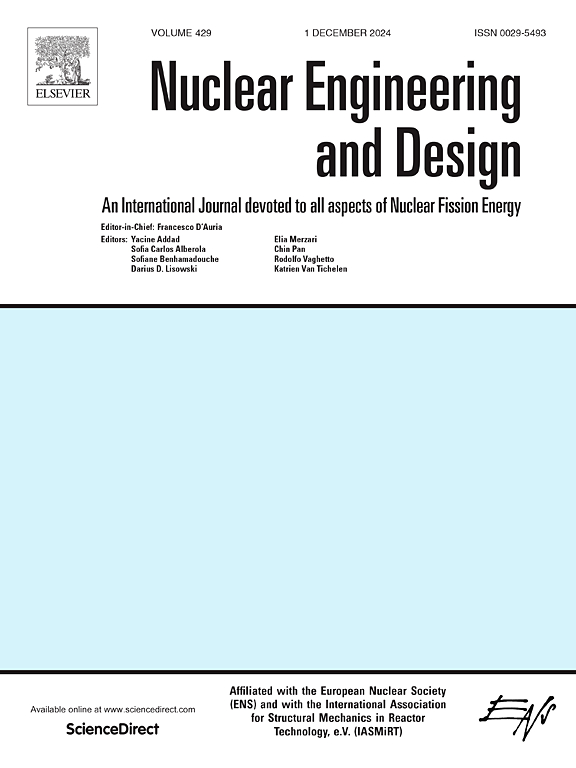考虑老化沉降流退化和近期衰减热测量的RSG-GAS LOFA安全裕度评价
IF 2.1
3区 工程技术
Q1 NUCLEAR SCIENCE & TECHNOLOGY
引用次数: 0
摘要
本研究评估了RSG-GAS研究堆在失流事故(LOFA)中的安全性能,特别关注老化对主泵滑行行为和关闭后衰变热的影响。由于反应堆已经运行了超过38年,机械退化,特别是泵飞轮,导致泵脱扣后冷却剂流量下降更快。为了捕捉这一效应,我们通过实验测量了最新的滑行流和衰减热分布,并使用PARET/ANL代码将其纳入LOFA模拟。分析比较了15兆瓦和30兆瓦初始功率水平下反应堆在调试和当前条件下的性能。结果表明,虽然更新后的轮廓稍微降低了安全边际,明显表现在较低的燃尽比和较高的冷却剂温度,但所有关键安全参数仍保持在反应堆的运行极限和条件(OLCs)之内。基于自然对流的被动安全系统,即使在泵惯性下降的情况下也能有效地去除衰变热。这些发现强调了将实时实验数据纳入安全评估的重要性,并证实了RSG-GAS反应堆在老化条件下继续安全运行。本文章由计算机程序翻译,如有差异,请以英文原文为准。
Safety margin evaluation of RSG-GAS during LOFA considering ageing-induced degradation of coast-down flow and recent decay heat measurement
This study evaluates the safety performance of the RSG-GAS research reactor during a Loss of Flow Accident (LOFA), with a particular focus on the effects of aging on primary pump coast-down behavior and post-shutdown decay heat. As the reactor has operated for over 38 years, mechanical degradation, especially in the pump flywheel, has led to a more rapid decline in coolant flow following a pump trip. To capture this effect, updated coast-down flow and decay heat profiles were experimentally measured and incorporated into LOFA simulations using the PARET/ANL code. The analysis compares reactor behavior under commissioning and current conditions at initial power levels of 15 MW and 30 MW. Results show that while the updated profiles slightly reduce safety margins, evident in lower burnout ratios and higher coolant temperatures, all key safety parameters remain within the reactor’s Operational Limits and Conditions (OLCs). The passive safety system, based on natural convection, effectively removes decay heat even with degraded pump inertia. These findings underscore the importance of incorporating real-time experimental data into safety evaluations and confirm that the RSG-GAS reactor continues to operate safely under ageing conditions.
求助全文
通过发布文献求助,成功后即可免费获取论文全文。
去求助
来源期刊

Nuclear Engineering and Design
工程技术-核科学技术
CiteScore
3.40
自引率
11.80%
发文量
377
审稿时长
5 months
期刊介绍:
Nuclear Engineering and Design covers the wide range of disciplines involved in the engineering, design, safety and construction of nuclear fission reactors. The Editors welcome papers both on applied and innovative aspects and developments in nuclear science and technology.
Fundamentals of Reactor Design include:
• Thermal-Hydraulics and Core Physics
• Safety Analysis, Risk Assessment (PSA)
• Structural and Mechanical Engineering
• Materials Science
• Fuel Behavior and Design
• Structural Plant Design
• Engineering of Reactor Components
• Experiments
Aspects beyond fundamentals of Reactor Design covered:
• Accident Mitigation Measures
• Reactor Control Systems
• Licensing Issues
• Safeguard Engineering
• Economy of Plants
• Reprocessing / Waste Disposal
• Applications of Nuclear Energy
• Maintenance
• Decommissioning
Papers on new reactor ideas and developments (Generation IV reactors) such as inherently safe modular HTRs, High Performance LWRs/HWRs and LMFBs/GFR will be considered; Actinide Burners, Accelerator Driven Systems, Energy Amplifiers and other special designs of power and research reactors and their applications are also encouraged.
 求助内容:
求助内容: 应助结果提醒方式:
应助结果提醒方式:


